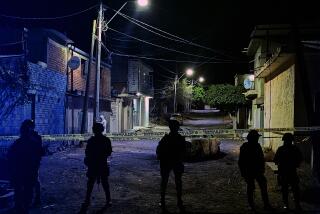High Court to Decide Prickly Cases Soon
The Supreme Court justices usually leave some of the hardest cases for the final month of the term, and this year is no different. The high court is due to decide 29 cases by the end of June, including nettlesome issues surrounding medical marijuana, the Ten Commandments and the Internet.
But this year, the term’s end could be overshadowed by the retirement of Chief Justice William H. Rehnquist. Since October, he has been treated for thyroid cancer. And though his voice has sounded stronger in recent weeks, he is widely expected to announce soon that he will step down at the end of the current term.
On Tuesday, the high court will meet to hand down rulings, and it is likely to issue decisions on one or two days each week for the rest of June. Here are key issues awaiting decisions:
Ten Commandments -- Can government officials prominently display the biblical commandments at public buildings or in courthouses to demonstrate the nation’s religious heritage? Or does this official display amount to the government’s promotion of religion in violation of the 1st Amendment? The court will rule on two cases: a Ten Commandments monument outside the Texas state Capitol and plaques featuring the commandments posted in Kentucky courthouses (Van Orden vs. Perry; McCreary County vs. ACLU).
Medical marijuana -- Can federal agents raid the homes of California patients who grow marijuana for their own use? Though the medical use of marijuana is legal in California and nine other states, federal authorities contend they can override those state laws. The U.S. 9th Circuit Court of Appeals said the federal officials had exceeded their constitutional power (Gonzales vs. Raich).
File sharing -- Can film studios and record labels go to court to shut down Internet-based companies that help computer users download free copies of music and movies? This is a multibillion-dollar question of copyright law. The movie and record industries contend unchecked Internet piracy threatens to make copyrights meaningless (MGM vs. Grokster).
Internet access -- Must cable and phone companies allow outside firms, such as Earthlink, to offer broadband Internet service to customers, or may they instead reserve their lines for their own broadband service? A divided Federal Communications Commission said cable companies could keep exclusive control of their lines. If the FCC prevails, it plans to adopt the same rule for phone companies. The outcome may determine how much choice consumers will have in Internet access (National Cable and Telecommunications Assn. vs. Brand X Internet; FCC vs. Brand X).
Property rights -- May cities seize private property to make way for business development? This Connecticut case could limit the government’s power of eminent domain. The Constitution says officials may take possession of private property for public use, and the homeowners who are fighting the city of New London say that private development does not constitute public use (Kelo vs. New London).
Restraining orders -- Can the police be sued for failing to enforce a restraining order? The case before the court involves a mother whose three daughters were murdered by her estranged husband. During the oral argument the justices were skeptical of the claim that the police could be held liable for not acting in time (Castle Rock vs. Gonzales).
Religion in prison -- Can Congress require state prisons to make special accommodations for the religious needs of their inmates? Five years ago, a bipartisan group of lawmakers won passage of a law to further religious liberty, but prison officials have opposed it (Cutter vs. Wilkinson).
Juries and race -- What should judges do if prosecutors remove several blacks from the jury pool? The high court has said the Constitution forbids racial bias in selecting jurors, but justices have struggled on how to enforce that rule. Two cases raise this issue (Johnson vs. California; Miller-El vs. Dretke).
Drug research -- Can scientists make use of patented drugs and devices while researching new drugs? A 1984 law exempted such research from charges of patent infringement, but that law had been read narrowly to cover only research data to be presented to the Food and Drug Administration. Scientists at the Scripps Research Institute of La Jolla were hit with a $15-million judgment for patent infringement (Merck KGaA vs. Integra Lifesciences).
Cruise ships -- Does the federal law that protects disabled Americans from discrimination apply to passengers who travel on foreign-flagged cruise ships? This case tests the reach of U.S. law (Spector vs. Norwegian Cruise Line).
More to Read
Start your day right
Sign up for Essential California for news, features and recommendations from the L.A. Times and beyond in your inbox six days a week.
You may occasionally receive promotional content from the Los Angeles Times.







